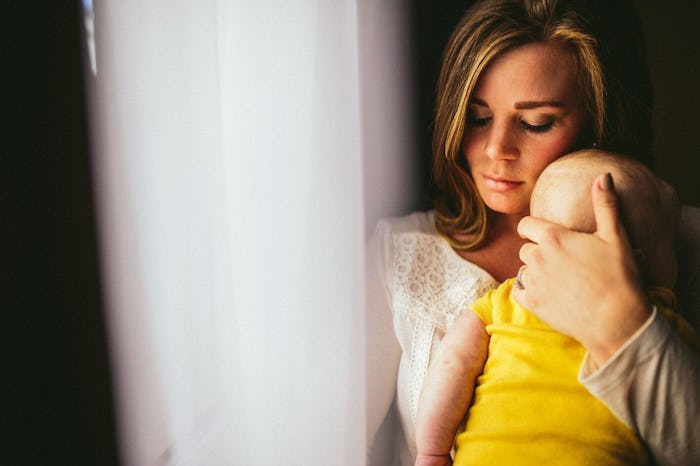Just when you think you've got this parenting thing figured out, your sweet, angelic baby suddenly turns into an irritable, crying, tiny monster who won't let you put them down and tries to eat everything in sight. If this change in your baby's behavior sounds familiar, your baby is most likely teething. But other than "monster-like," what are some other signs your baby is teething and not just crying?
According to Parenting, teething can start as early as four months and as late as (or later than) their first birthday. Some babies handle teething like it's nothing, showing almost no symptoms other than a new tooth popping through. Others, though, experience much more discomfort and will make sure you know it.
Luckily, whether your baby is overly demonstrative or not, there are lots of tell-tale signs — from waking more often at night, to changes in appetite, to drooling abnormally — that will help you identify the root cause of their pain.
If nothing else, keep in mind that this phase is only temporary and as their parent, you can provide comfort that nothing else can, even if it's just extra snuggles at night or a few more breastfeeding sessions during the day.
1They're Abnormally Irritable Or Clingy
Teething understandably causes a lot of pain for our little ones. (Baby Center noted that teething pain is comparable to wisdom teeth coming through.) So they'll likely be fussy and clingy while they're teething. Simply snuggling and holding your baby a bit more can do wonders to comfort them.
2They Drool A Lot
According to an article from Babble, teething babies drool more than usual because the saliva helps sooth their inflamed gums.
3They're Running A Low Grade Fever
You baby may run a low grade fever (less than 100 degrees) while they're teething. Dr. Sears noted that low fevers are harmless and you only need to bring your baby in to see the doctor if the fever exceeds 100 degrees or lasts for three or more consecutive days.
4You Can See A Tooth Below Their Gums
One of the most obvious signs of teething is actually being able to see or feel a tooth that's about to break through the gums. According to Parents, this is caused by the irritation of a new tooth coming through and can be eased with cold wash cloths or frozen teething toys.
5They're Putting Everything In Their Mouths
Parenting noted that your teething baby will reach for anything and everything to chew on, even more so than normal. If you're breastfeeding, this unfortunately probably includes your breast too.
6They Pull On Their Ears
According to What To Expect, the nerve endings affected by teething are shared with the gums, ears, and cheeks, so it's normal to see ear pulling and cheek rubbing during teething. However, ear pulling is also a common sign of ear infection, so be sure to check with your doctor if you suspect anything more than teething.
7They Wake More Than Usual
Night waking is common in teething babies, according to Baby Center, because they may need a little extra comfort during the night. They might not nap as well either, so be prepared for some long days and nights.
8They Develop A Drool Rash
If your baby has been drooling a lot, they may develop a "drool rash" or a red, irritated patch of skin on their chin and around their mouth. According to Dr. Sears, these drool rashes are harmless, but can be calmed with lanolin, or other calming salves safe for baby skin.
9They Turn Away From Food
Your baby may develop a change in eating habits, like switching from preferring solids to craving breastfeeding. Parenting suggests to indulge in your baby's preferences because certain foods may help comfort them.
